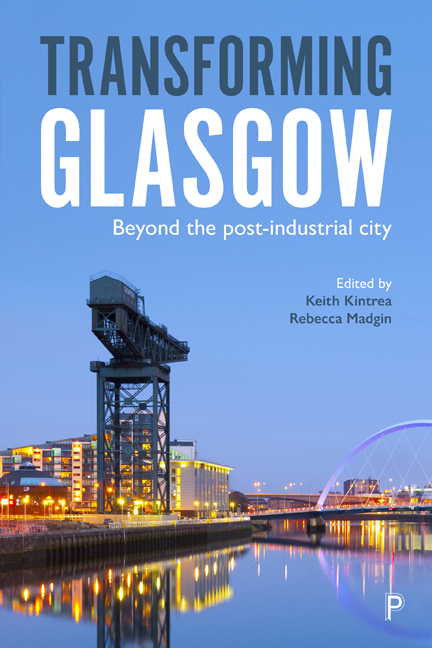Book contents
- Frontmatter
- Contents
- List of Maps, Tables, Figures and Boxes
- Notes on Contributors
- Acknowledgements
- Foreword
- Map
- Introduction: Transforming Post-Industrial Glasgow – Moving Beyond the Epic and the Toxic
- PART I
- PART II
- PART III
- Conclusion: Beyond the Post-Industrial – Narratives of Time and Place
- Index
PART III
Published online by Cambridge University Press: 25 March 2021
- Frontmatter
- Contents
- List of Maps, Tables, Figures and Boxes
- Notes on Contributors
- Acknowledgements
- Foreword
- Map
- Introduction: Transforming Post-Industrial Glasgow – Moving Beyond the Epic and the Toxic
- PART I
- PART II
- PART III
- Conclusion: Beyond the Post-Industrial – Narratives of Time and Place
- Index
Summary
The chapters that make up Part III are primarily focused on the built and natural environment within the city. They each seek to examine the ways in which these environments have been transformed as part of the shift to the post-industrial city and beyond. Together the chapters engage with the role of legacy within the concept of the post-industrial city. They do so by problematising how the industrial legacy – in terms of built form, governance practices, policies and approaches – has shaped the transition to post-industrialism and beyond.
James T. White (Chapter 10) provides a detailed documentation of the emergence of new residential neighbourhoods that are replacing demolished public housing estates. He analyses the reasons why the tenement, an epic visual legacy from the industrial period, has returned to the forefront of urban design policy. Chapter 11, by Rebecca Madgin, provides insight into the important role of Glasgow’s inherited environment, both from the mercantile and industrial periods, in managing the transition to a post-industrial city, as it has been re-purposed as an asset that can lever positive social and economic change. Venda Louise Pollock in Chapter 12 looks at how culture has contributed to transforming Glasgow in order to question whether ways of working that proved so successful during the latter decades of the 20th century should have a future. On the basis of a careful analysis of Glasgow’s experience, she argues that understanding the real power of culture to remake cities requires a better understanding of locally specific cultural practices. The subject of the final empirical contribution is environmental sustainability policy in Glasgow, particularly with regard to its green spaces (Chapter 13, by Larissa A. Naylor, Ellie Murtagh and Hugh Kippen). Within this chapter they continue the theme of the ways in which the past, present and future inform the development of the city.
Taken together, these four chapters return to the notion of legacy first raised in Part I. However, here they demonstrate the ways in which approaches towards the future of the built and natural environment are informed by a longer-term legacy. In the context of the post-industrial transition they demonstrate the importance of coming to terms with the legacy of the industrial and de-industrial as the city goes beyond characterisation as post-industrial.
- Type
- Chapter
- Information
- Transforming GlasgowBeyond the Post-Industrial City, pp. 199 - 200Publisher: Bristol University PressPrint publication year: 2019



